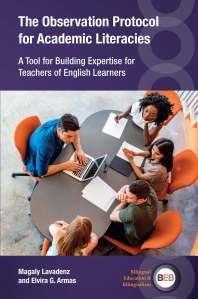We recently published The Observation Protocol for Academic Literacies by Magaly Lavadenz and Elvira G. Armas. In this post the authors explain what the Observation Protocol for Academic Literacies (OPAL) is and why it’s important.
What were the origins of the book?
 Originally, we knew that we wanted to develop a tool to support culturally and linguistically diverse students’ learning – specifically English Learners – through understanding their teachers’ professional practices to inform education systems. We spent many hours in over 300 Pre-K-12th grade classrooms across 22 sites and captured anecdotal notes to create vignettes and highlights of classroom practice, including video footage from select classrooms. Once we had developed and tested the tool, we created a three-day institute to share the key principles of the science and practice of observation and the research background and context for The Observation Protocol for Academic Literacies (OPAL). We used video and written vignettes that we collected and created processes to practice scoring and capturing anecdotal notes with the OPAL. After about 10 years of Institutes, we decided to work towards converting these lived experiences into a book format.
Originally, we knew that we wanted to develop a tool to support culturally and linguistically diverse students’ learning – specifically English Learners – through understanding their teachers’ professional practices to inform education systems. We spent many hours in over 300 Pre-K-12th grade classrooms across 22 sites and captured anecdotal notes to create vignettes and highlights of classroom practice, including video footage from select classrooms. Once we had developed and tested the tool, we created a three-day institute to share the key principles of the science and practice of observation and the research background and context for The Observation Protocol for Academic Literacies (OPAL). We used video and written vignettes that we collected and created processes to practice scoring and capturing anecdotal notes with the OPAL. After about 10 years of Institutes, we decided to work towards converting these lived experiences into a book format.
What is OPAL and how can it be used?
The OPAL is a classroom observation tool comprised of four research-based domains and 18 indicators. The OPAL is intricately woven into each chapter of our book, with four chapters dedicated to learning about how to “look for” evidence in each domain with clear vignettes and snapshots from real Pre-K-12 classrooms. We share the research literature to foreground the empirical literature that informed the OPAL and the skill of objective observation. We end the book with many examples of how, along with other OPAL users across the educational continuum, we have used the OPAL to support teachers, identify priorities in professional learning, and inform research.
Why is the book so needed?
There is so much “unpacking” to do when it comes to EL teachers’ practices and we don’t believe in formulas. Our book helps to unpack pedagogical gems gleaned from the research and reflected in the OPAL instrument to help sharpen our focus on ELs across any type of instructional setting. The OPAL offers a compass to gain a deeper understanding of effective teaching and learning for ELs to tailor teaching methods responsive to students’ linguistic, academic, and social-emotional needs. By embracing the OPAL protocol, educators, researchers, and institutions can collectively contribute to the cultivation of a robust community of practice that is elevated through personal and collective professional reflection.
What do you hope readers take away from the book?
We wanted to transform our in-person OPAL Institutes into a resource that can be more broadly used, from preservice to inservice teachers, professional development and for administrators who can make policy decisions for how teachers can support each other through peer observations, learning and resource allocation. This includes time for critical reflection on the education of English Learners to promote deep learning and development of academic literacies among students.
What is your next academic project after this one?
One of the next projects that our team is working on and which we’re so excited about is focused on Adolescent Superdiversity. We want to break apart the notion of a monolithic definition of English Learners and subtypologies by uplifting the voices of superdiverse adolescent youth across the state. We have been meeting with these youth and they have many important and compelling ideas and insights to share, from which we can all learn!
What books – either for work or for pleasure – are you reading at the moment?
Magaly is reading The Power of Language: Multilingualism, Self and Society (2023) by Viorica Marian. Elvira is reading Unearthing Joy: A Guide to Culturally and Historically Responsive Teaching and Learning (2023) by Gholdy Muhammad.
Magaly Lavadenz and Elvira G. Armas
For more information about this book please see our website.
If you found this interesting, you might also like Professional Development through Teacher Research edited by Darío Luis Banegas, Emily Edwards and Luis S. Villacañas de Castro.